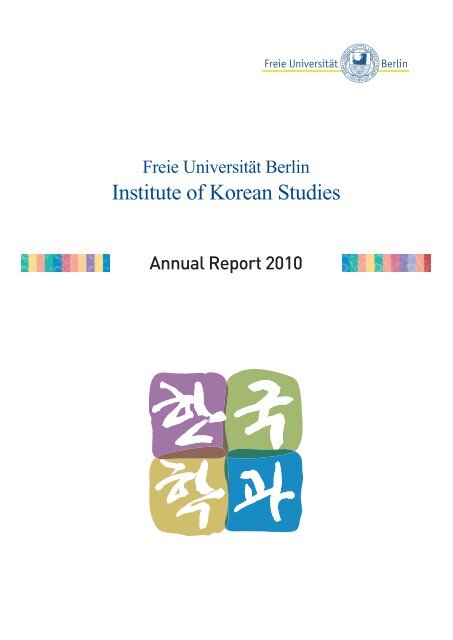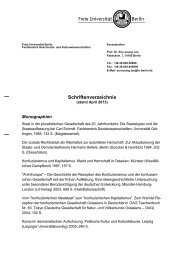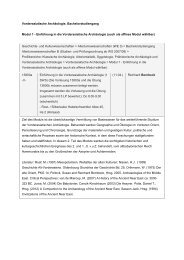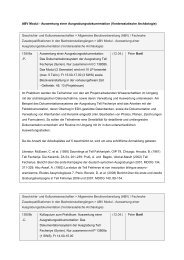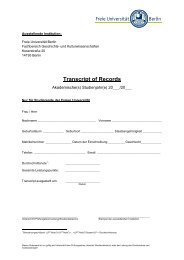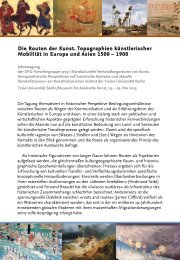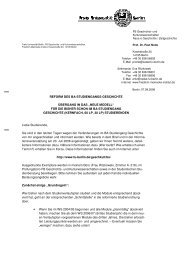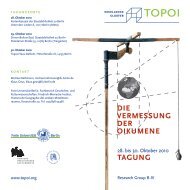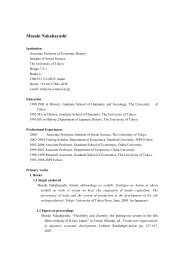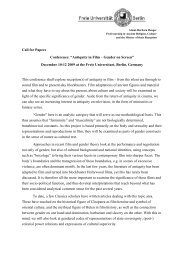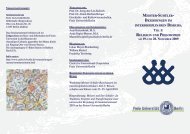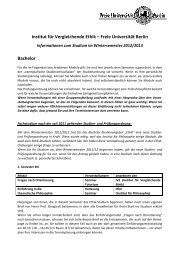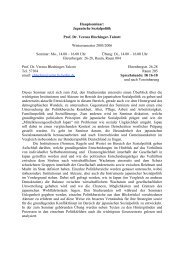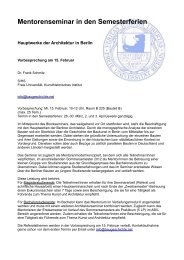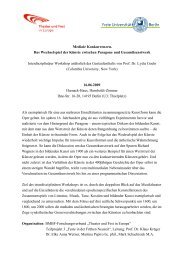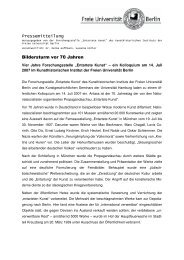FU Annual 2010 - Freie Universität Berlin
FU Annual 2010 - Freie Universität Berlin
FU Annual 2010 - Freie Universität Berlin
Create successful ePaper yourself
Turn your PDF publications into a flip-book with our unique Google optimized e-Paper software.
<strong>Freie</strong> <strong>Universität</strong> <strong>Berlin</strong><br />
Institute of Korean Studies<br />
<strong>Annual</strong> Report <strong>2010</strong>
Director’s Welcome<br />
The year <strong>2010</strong> is over, and the year 2011 has started. It is<br />
time to put the diverse events we experienced in the previous<br />
year behind us. In the past year, not all of the news<br />
from the Korean Peninsula brought happiness to those of<br />
us who specialize in Korean studies.<br />
We have created this annual report of the Institute of<br />
Korean Studies (IKS) at the <strong>Freie</strong> <strong>Universität</strong> <strong>Berlin</strong>, in<br />
the hope that this year will see many things emerge that<br />
will make us all happy together.<br />
The year <strong>2010</strong> was a very important year for our IKS,<br />
since we made quantum leaps in achievements in our overall activities in education and research, both<br />
quantitatively and qualitatively.<br />
One of our proudest moments was the entrance in October <strong>2010</strong> of the second cohort into our MA<br />
Program, which had been newly launched during the winter semester of 2009. Furthermore, more than<br />
10 students were selected to be exchange students for a semester, and dispatched to our sister universities<br />
in Seoul. They are expected to improve and develop their capacities with regard to their studies in our<br />
institute.<br />
IKS held diverse academic events, which served to intensify academic exchanges. IKS also completed<br />
large-scale research projects, in which a wide range of experts delivered research results contributing to<br />
significant knowledge.<br />
It was only thanks to your attention to and support for our development that we at IKS were able to successfully<br />
tackle the many tasks we had embarked in our young institute.<br />
I would like to extend my deep appreciation for your warm attention to and encouragement for us once<br />
again, and to kindly ask for your continued support in the year 2011 as well.<br />
Prof. Dr. Eun-Jeung Lee<br />
Director of the Institute of Korean Studies<br />
Contents<br />
People 2<br />
Research Projects 3<br />
Conferences 5<br />
Special Lectures 10<br />
Guest Professors 16<br />
Study Programs 18<br />
Student News 20<br />
Events and Visitors 21<br />
Publications 24<br />
3
People<br />
Regular Staff<br />
Prof. Dr. Eun-Jeung Lee (Institute Director)<br />
Dr. Hannes B. Mosler (Research and Teaching Fellow)<br />
Eric J. Ballbach, M.A. (Research and Teaching Fellow)<br />
Dr. Holmer Brochlos (Senior Lecturer)<br />
Dr. Eun-Hee Kim (Senior Lecturer)<br />
Research Staff for the Institute-Grant-Project of the Academy of Korean Studies<br />
Dr. Myung Joon Park (Research Fellow)<br />
Dr. Hee-Seok Park (Research Fellow)<br />
Daniela Claus (MA-Scholarship Fellow)<br />
Research Staff for the Project: 20 Years of Unification in Germany and its Lesson for Korea<br />
Dr. Werner Pfennig (Project Coordinator), Dr. Chang Soo Park, Sugeen Park, M.A., Richard<br />
Pfennig, M.A., Alexander Pfennig, M.A., Hye-Jin Choi, M.A., Hae-Won Choi, M.A., Arne Bartzsch,<br />
M.A., Jörg Becker, M.A., Hoon Jung, M.A., Daniela Claus, Chi Hwan Lee, Christian Schulten<br />
Guest Professors<br />
Visiting Scholars<br />
Teaching Staff<br />
Secretary<br />
Student Assistant<br />
Dr. Sonja Häußler (Korea Foundation Visiting Professor)<br />
Prof. Dr. Hyoje Cho (DAAD STAR Professor / SungKonghoe University in Seoul)<br />
Dr. Hak Joon Kim (Alexander von Humboldt Fellow / Former President of Donga Ilbo newspaper)<br />
Ki-Hyeok Kim, M.A. (Ministry of Unification in Korea)<br />
Prof. Dr. Chongoh Lee (Myungji University)<br />
Prof. Dr. Sang Ran Lee (Sogang University)<br />
PD Dr. Dorothée de Nève<br />
Dr. Yoonkyoung Lee<br />
Dr. Klemens Schwitzer<br />
Euna Moon, M.A.<br />
Sugeen Park, M.A.<br />
Andrea Großkopf<br />
Chi Hwan Lee<br />
4
Research Projects<br />
“Circulation of Knowledge and Dynamics of Transformation”<br />
AKS Institute Grant Project<br />
June 2009 - August 2014<br />
In June 2009, the Academy of Korean Studies (AKS) awarded a five-year grant for the research project,<br />
Circulation of Knowledge and Dynamics of Transformation,to a research consortium comprised of<br />
our IKS and Korean Studies (Korean Language and Culture) at the Ruhr <strong>Universität</strong> Bochum.<br />
In <strong>2010</strong> we made significant progress on this project. Within this framework, our research projects are<br />
being conducted in two grand thematic areas: (I) culture, value, ideology and elites, and (II) policy, institution<br />
and structural change. Having formed respective research plans at the beginning, our project participants<br />
(IKS research team) already started to produce research results. For the first year, we completed<br />
three books and several academic articles (see the section of Publications in this report). Knowledge<br />
transfer channels also include a website in order to communicate both between us and with our sponsors,<br />
supporters and observers (http://www.bb-koreanstudies.de/en/index.html).<br />
Four researchers of the IKS actively organized a research panel and joined the 5th World Congress of<br />
Korean Studies, which took place in Taipei, Taiwan, on 27 October <strong>2010</strong>. Combining research with<br />
teaching, our research teams are also providing our students with their expertise. Some MA students are<br />
receiving scholarships within the framework of this project, and are expected to make their own contribution<br />
to the project by developing their own research projects.<br />
Thanks to these active works, our research team was officially ranked at the highest position during the<br />
first year evaluation conducted in April <strong>2010</strong> by the AKS. Our research team is gearing up its research<br />
and outreach activities in order to continue this success in the second year of the project, which is going<br />
on to mid-2011. The research team is today energetically driving their projects.<br />
5
“Twenty Years of Reunification in Germany and its Lesson for Korea”<br />
As an institute oriented to social scientific studies, the<br />
IKS conducts primarily academic research but also<br />
applied research with direct policy implications.<br />
Against this background, the research project Twenty<br />
Years of Reunification in Germany and its Lesson for<br />
Koreastrove to apply a deeper understanding of the<br />
processes and outcomes of German reunification experiences<br />
and contribute to the search for practical implications<br />
for Korea.<br />
German reunification is the sole case where reunification<br />
was achieved in a peaceful way and is thus of natural<br />
relevance to Korea. Although German reunification<br />
and the subsequent efforts to solve ensuing issues<br />
since 1990 are not readily transferable to Korea, there<br />
exist numerous implications, which can provide lively<br />
and concrete references for the transformation and integration<br />
of the two regimes in the Korean Peninsula.<br />
The anniversary year of <strong>2010</strong> lent an important and<br />
suitable impetus to systematically review and study the<br />
German case. Accordingly the IKS launched and managed<br />
a research project, Twenty Years of Reunification<br />
in Germany and its Lessons for Korea, in<br />
which the participants pursued to more systematically<br />
overview the selective processes of the German reunification<br />
after the formal achievement with an emphasis<br />
on the micro-level processes of practical implementation.<br />
Bearing special relevance to Korea, they were interested<br />
not only in the early phase of reunification, when<br />
the regime transformation took place but also in the<br />
extended phases, in which reintegration policies were<br />
formulated and implemented after the late 1990s. In<br />
this way, the IKS project expects to make a contribution<br />
to carefully preparing for the possible reunification<br />
of the Korean Peninsula in the future.<br />
This project was managed by Prof. Eun-Jeung Lee,<br />
director of the IKS with a responsible coordination by<br />
Dr. Werner Pfennig, an expert of East Asian foreign<br />
policies at <strong>Freie</strong> <strong>Universität</strong> <strong>Berlin</strong>, supported by several<br />
young researchers. It was intensively driven between<br />
February and December <strong>2010</strong> at the IKS. The result of<br />
the systematic documentation and analyses amounts to<br />
22 volumes with 14,500 pages, and is publicly available<br />
at the library of <strong>Freie</strong> <strong>Universität</strong> <strong>Berlin</strong>.<br />
February - December <strong>2010</strong><br />
6
Conferences<br />
“Heimat/los und Moderne”<br />
KLTI Literature Conference<br />
20-21 November 2009<br />
Supported by the Korea Literature Translation Institute (KLTI),<br />
the IKS convened an international conference, Heimat/los<br />
und Moderne(hometown/rootlessness and modernity), in<br />
which the participants respectively pursued to reconstruct the<br />
concepts of Heimat (hometown)and Heimatlos (rootlessness)<br />
in the various Korean literatures. In the conference,<br />
which took place at the Seminar Center of <strong>Freie</strong> <strong>Universität</strong><br />
<strong>Berlin</strong>, six topics were presented and discussed. In the first<br />
panel, Prof. Seongu Chun dealt with an encounter between traditional<br />
Korean and Christian thoughts during Kaehwagi, as<br />
well as its influences on the development of Korean society<br />
thereafter in his presentation, Hometown as fate and an absence of hometown. In the same panel,<br />
Hyang Joo Yang dealt with an implication of hometown in the poems of Kim Sowol, searching for<br />
understanding the development of Korea beyond a dichotomy between Western and Eastern, or between<br />
pre-modern and modern. In the second panel, Prof. Helga Picht analyzed Toji, a famous novel by Park<br />
Kyongni, discussing the meanings of hometown as a social space in her text. Then, Dr. Kai Köhler<br />
focused on Seoul as a hometown in the Korean literatures translated into German, comparing the images<br />
of hometowns in German and Korean. The first day ended with a reception, where the Korean novelist<br />
Sunok Kong gave a talk in the opening dialogue and presented her feelings and impressions of <strong>Berlin</strong> as<br />
a city having overcome the national tragedy of division, as a writer from a country still divided. In the<br />
third panel, Dennis Bürthner discussed the image of hometown in the Korean classic literatures, especially<br />
Kǔmoshinhwa by Kim Si-sǔp; then, Natali Junghwa Han analyzed how hometown was described<br />
in Toji from a gender-centered perspective with a focus on the characters in the novel. In the final session,<br />
all of the participants synthetically discussed linguistic approaches to hometown in Korean language;<br />
a reconstruction and change of the images on hometown within a tension between tradition and<br />
modernity; and the spiritual rootlessness of Korean in-tellectuals, who have considered Western societies<br />
as their ideal hometown since Kaehwagi. Participants found the conference to be very productive and<br />
enlightening.<br />
7
“Civil Society within Democratic Systems: Localization and Functions”<br />
Korea Democracy Foundation Conference<br />
5 - 6 June <strong>2010</strong><br />
Arguably, no social scientific concept is more complicated and<br />
controversial than civil society. No other political concepts<br />
have undergone more reformulations and reconfigurations than<br />
the concept of civil society. The IKS and the Korea<br />
Democracy Foundation (KDF) held the second annual conference<br />
on civil society in the summer of <strong>2010</strong>. Following the<br />
inaugurating conference in the previous year, the conference<br />
was aimed to deepen the debates where it left off, while at the<br />
same time break new ground by considering civil society within<br />
the democratic system and, above all, mapping out the<br />
politicityof civil society from a new theoretical perspective.<br />
The main questions that stood at the start of this conference<br />
can be summarized as follows: What is civil society - and what<br />
is not? What kind of components does civil society encompass? Are civil society organizations distinctive<br />
new phenomena, or do they merely reflect a repackaged form of more familiar organizations? To<br />
what extent is the boundary of civil society demarcated within the democratic political system? What<br />
kind of role can or should civil society organizations play within the democratic system? Are there any<br />
particular political principles - community, citizenship, social structure, the rulers and the ruled, authority,<br />
justice, and change, among others - for which civil society organizations can specifically exert influences?<br />
What kinds of institutions are necessary in order for civil society organizations to function in a<br />
way that promotes the good of whole society?<br />
In ancient times, civil society was conceptualized as societas civilis or politike koinonia as it is now in<br />
contemporary world. The resurgence of a civil society discourse in the last several decades in general,<br />
and the acceleration of civil societys visibility after the transformation of the East European system in<br />
particular, have made the scientific investigation into the questions enumerated in the above an urgent<br />
and topical task as ever. The conference convened, fully aware of these circumstances and background.<br />
The conference started with opening remarks by Keun-Sik Jung from the KDF Research Institute and<br />
the keynote speech by Sei-Ung Ham, president of the KDF. On the first day, two panels were held, titled<br />
The Political and Civil Society(Panel I) and Comparative Case Studies of Eastern Europe and<br />
Korea(Panel II). On the following day the third and last panel was held, which was followed by concluding<br />
discussions, where all participants from Germany and South Korea participated.<br />
8
“Germany and South Korea facing the Challenges of Societal Cohesion”<br />
Joint Conference by German Federal Agency for Civic Education and Korea Civic<br />
Education Institute for Democracy<br />
11-12 October <strong>2010</strong><br />
Social cohesion on the basis of integrative tolerance is a central<br />
topic in many societies around the globe. The people are the<br />
medium, within which politics and economics take place. That<br />
is the reason why they are more and more affected by forces of<br />
conflict in the wake of globalization. At the same time, however,<br />
these people are requested to develop alternatives in order to<br />
make possible a peaceful and happy life. In many societies we<br />
find converging developments that potentially can threaten this<br />
kind of life worth living, while also bearing new chances, i.e. -<br />
rapid aging of society, immigration inflows, and diversification<br />
of society. Germany and South Korea share all these phenomena<br />
of potentially segregating developments. That was the starting<br />
point for this years conference at the IKS. We invited wellknown<br />
scholars of the field of study as well as professional<br />
practitioners in order to ensure a balanced exchange between<br />
theory and practice. After introductory welcome notes and keynote speeches by the vice-president of<br />
<strong>Freie</strong> <strong>Universität</strong> <strong>Berlin</strong>, Werner Väth, vice-director of Korea Civic Education Institute for Democracy,<br />
Jungsik Jung, Christoph Müller-Hofstede of the German Federal Agency for Civic Education, and<br />
Norbert Seitz from the Ministry of the Interior, four panels convened with three presentations each, commented<br />
on by designated discussants. On the first day, Panel 1 commenced on the subject of Societal<br />
cohesion: conceptual debates and political strategies - a German-South Korean comparison. On the second<br />
day the panels were titled Citizens movements in the digital age: possibilities and risks of the new<br />
ways of mobilization and consequences for the political education(Panel 2), Migration and integration<br />
as a challenge for societal cohesion - theoretical and practical approaches from a German-South Korean<br />
comparison(Panel 3), and Youth and societal cohesion(Panel 4). From South Korea, four scholars<br />
(Jungsik Jung, Young Sik huh, Chang Hwa Jung, Du-Chel Sin) and four activists (Ran Ju Lee, Yang<br />
Hyeon Kim, Sang Young Park, Jeong Hyeok) were invited. From Germany, nine scholars (Thomas<br />
Meyer, Barbara John, Christian Meisselbach, Urmila Goel, You Jae Lee) and researchers/activists<br />
(Norbert Seitz, Thorsten Schilling, Arnold Mengelkoch, Christoph Müller-Hofstede, Claudia Dan-tschke)<br />
participated actively through presentations, discussions, and comments.<br />
9
“Korea under Change”<br />
KOREATAGE: The 3rd Workshop supported by Korea Foundation<br />
5-6 November <strong>2010</strong><br />
The third gathering of Korean Studies scholars from German<br />
speaking countries took place at the IKS under the title of<br />
Korea under Change, having called for a wide variety of different<br />
papers and presentations that would allow for intensive<br />
and interdisciplinary exchanges among the scholars in the relevant<br />
fields. Over the two days of the conference, six different<br />
panels were held, dealing with various subjects such as circulation<br />
of knowledge in ancient Korea, socio-cultural change<br />
traced through artifacts and performances, globalization and<br />
internationalization of management in East Asia, analysis of<br />
the dynamics of policy actors at different state levels in North<br />
and South Korea, and other current topics such as the presidential<br />
nation branding committee. Next to the keynote speech<br />
given by the well-known specialist on the Korean Peninsula,<br />
Prof. Dr. Karl Gottfried Kindermann, 15 speeches were delivered<br />
on distinguished topics, which were commented on by designated discussants with equally professional<br />
academic background.<br />
Next to the academic and professional exchanges among scholars, the event this time served as a springboard<br />
for the establishment of an association. The evaluation podium discussion at the end of the second<br />
day was followed by an official founding convention that lead to the first Korean Studies Association of<br />
German speaking countries in Europe. This successful foundation of the Association, which in the past<br />
has been attempted in vain, can be understood as a substantial achievement in the history of Korean<br />
Studies in German speaking countries. Besides the general benefits as a scholarly association, it is further<br />
expected to serve as an important institution that ensures steady exchanges among the scholars in<br />
the field and will hold regular gatherings in the future.<br />
The conference was already an impressive success due to the fact that a large number of scholars from<br />
important universities and institutions all over the German speaking countries came to <strong>Berlin</strong> for this<br />
occasion, which had an extraordinarily significant implication in this time, when Korean Studies become<br />
more and more important in Europe and the world. Furthermore, the presentations and following discussions<br />
were very lively and substantially fruitful. The whole workshop was supported by the Korea<br />
Foundation (KF) and active involvement of the KFs representative to Germany.<br />
10
“Peace and Democracy in Korea”<br />
Joint Conference by <strong>Freie</strong> <strong>Universität</strong> <strong>Berlin</strong> and Friedrich Ebert Foundation<br />
9 December <strong>2010</strong><br />
<strong>Freie</strong> <strong>Universität</strong> <strong>Berlin</strong>, together with the Friedrich-Ebert-<br />
Stiftung (FES), organized a podium discussion, celebrating the<br />
10th anniversary of the Nobel Peace Prize awarded to the late<br />
president of South Korea, Kim Dae Jung, who stated his <strong>Berlin</strong><br />
Declaration at this very location of the Henry Ford Building of<br />
<strong>Freie</strong> <strong>Universität</strong> <strong>Berlin</strong> ten years ago, just three months before<br />
the historical summit meeting in Pyongyang. The event did not<br />
only function as a memorial for the historical figure and his<br />
close and important connection to Germany and the spirit of<br />
<strong>Freie</strong> <strong>Universität</strong> <strong>Berlin</strong>, but also served as a valuable opportunity<br />
for an encounter between the two architects of Germanys<br />
Ostpolitik and South Koreas Sunshine Policy, Egon Bahr and<br />
Dong Won Lim.<br />
This very interesting and inspiring discussion was moderated<br />
by Karin Janz, who spent a long time in North Korea. More<br />
than 150 interested people joined the event to follow the discussions of Mr. Lim and Mr. Bahr, but also<br />
to enjoy the small classical concert at the end of the discussion. Among the guests were the current<br />
President of <strong>Freie</strong> <strong>Universität</strong> <strong>Berlin</strong>, Prof. Dr. Peter-André Alt, and Dr. Werner Pfennig, an old friend of<br />
the late president Kim Dae Jung who held the keynote speech. In the event, the participants confirmed<br />
again what would have been or not been the case under the Sunshine Policy, which was one of the most<br />
famous of Kim Dae Jungs many achievements, even though it is overshadowed today by the recent<br />
Yeonpyeong Island incident. The successful event closed with a harmonious get-together at the end of<br />
the event in the foyer of the Henry Ford Building, where pictures of Kim Dae Jung at historical occasions<br />
were exhibited.<br />
11
Special Lectures<br />
DAAD-<strong>FU</strong> Special Lecture Series:<br />
Human Rights in Contemporary Korea<br />
The economy firstpolicy and<br />
human rights of Korea<br />
2 November <strong>2010</strong><br />
In a lecture titled Obscuring the Causes of Human<br />
Rights: South Korea in an Economy-FirstEra,<br />
Professor Kyong Whan Ahn of the law school of<br />
Seoul National University gave a sweeping<br />
overview of the present state of human rights in<br />
South Korea, the challenges that the human rights<br />
community currently faces and the possible prospect<br />
for the protection of human rights in the future.<br />
Professor Ahns lecture touched upon the development<br />
of the country through the lens of both the<br />
political and economic developments. His basic<br />
argument was that Korea has passed through rather<br />
tumultuous paths with many problems and dark<br />
days but it was able to consolidate its democracy<br />
after the 1987 democratization watershed. In this process of soft landingof rule of law, the principle of<br />
human rights has played a critical role to help the country achieve what it has accomplished so far not<br />
only in the majoritarian democratic sense but also in the sense of protection of minority voices and<br />
forgottenagenda of the less powerful. The current standing of the human rights principle within the<br />
entire governing ethos and the role of human rights movements seem to have encountered setbacks since<br />
the election of a new conservative government<br />
in 2008. Nowhere has this challenge<br />
been more severe in the form of the Economy-Firstpolicy<br />
of the new administration.<br />
But Professor Ahn predicted that the present<br />
situation, albeit disappointing, should be<br />
understood as an inevitable part of a long<br />
and arduous process of democratization and<br />
the rule of law. His cautious but optimistic<br />
note was sealed with the memorable adage<br />
that we should be hungry for justice and<br />
angry about injustice!This well-attended<br />
event illustrated the importance of human<br />
rights in the healthy functioning of democracy<br />
and the indicative value of human rights<br />
for the future development of South Korea<br />
in political as well as in economic sense.<br />
10
“Fall into disfavor: An artist’s journey into the world of the down-and-out”<br />
16 November <strong>2010</strong><br />
The lecture of Geumsun Han, a photographic artist<br />
and human rights activist, was a combination of personal<br />
reflection and a series of photo shows. Han<br />
started her talk by taking a birds eye view of the<br />
modern history of Korea, its achievements and sufferings,<br />
its despair as well as hope. It was followed<br />
by a three-part series of photo presentations, each of<br />
which represented different aspect of human rights in<br />
contemporary Korea. The first series dealt with the<br />
reality associated with the division of Korean<br />
Peninsula at the end of the World War and the<br />
consequences of its continuing separation. Hans haunting images of those Korean families - in the South<br />
as well as in the North - who were forced to separate from each other poignantly captured the very source<br />
of pain many Koreans still acutely feel. The next series described the stark contrast between the extremely<br />
rich segment of society and the extremely deprived community. This disparity, according to her, was<br />
caused by the rapid expansion of economy at the expense of those who were left behind. The focus of her<br />
attention was revolved around a place in the south of Han River where new high rises of luxurious apartment<br />
blocks were standing side by side with an urban shanty town. The comparison took a striking note<br />
which left an indelible mark on the mind of the audience. The final series touched upon the sight of the<br />
large-scale civil engineering work which was currently under way in the major rivers in the country. The<br />
construction project has been a source of great controversy recently because it has not only been done<br />
without due consideration of the environmental protection, but also trampled on the livelihood of ordinary<br />
peasants who depended their livelihood on the rivers. There has been a complete reversal of meaning in<br />
the project, i.e. from a nominal policy for the protection of rivers to an indiscriminate exploitation of<br />
rivers.<br />
“From dream to reality in South Korea: The social entrepreneur in<br />
fashion industry”<br />
7 December <strong>2010</strong><br />
In the talk given by Dr. Soonok Chun, an industrial relations<br />
expert and labor activist as well as social entrepreneur in<br />
Korea, the presentation began by introducing her connection<br />
with the city of <strong>Berlin</strong> even before the fall of its wall in 1989.<br />
Her stay in the city at the time made her awaken to the value of<br />
serious study in labor. She then went on to describe her youth,<br />
her parents and her siblings including her elder brother Chun<br />
Tae-il. Contrary to the general perception, her brother was a<br />
really cheerful person with compassion for those young workers<br />
in the garment factory around him. She recalls her brother<br />
as a very funny man.Although the family was in extreme<br />
poverty they cared for each other. Working conditions for textile<br />
workers at the time were drastic and harsh. Sixteen hours<br />
11
work a day was considered normal and the physical, environmental and psychological deprivation of the<br />
sweatshops was beyond imagination. As a result young workers died a slow death every day. In spite of<br />
Tae-ils earnest effort to improve the condition for his co-workers through legal means (such as Labor<br />
Standard Law) every move was either blocked or fell on deaf ears. This eventually led Tae-il to the ultimate<br />
and fatal decision - to make himself a sacrifice for all the workers. His death on 13 November 1970<br />
and its aftermaths were a turning point for not only the workersmovement in Korea but also for his<br />
family as well. Tae-ils mother, Ms So-seon Lee, became a workersactivist herself bearing the full brunt<br />
of all the hardship. Yet, Lee did what she did because it was a promise that she made to her dying son.<br />
Dr. Soonok Chun followed the path of her brother, working briefly in a factory herself before she made<br />
the decision to study in Britain. She wanted to know the real causes of things - why workers should live<br />
the endless miserable life despite all the difficulties that they had to endure? The study led her to earn a<br />
doctorate in industrial relations which was followed by a stint as a factory worker in Seoul, then research<br />
position for the labor movement, and finally as a social entrepreneur in the garment industry. She is now<br />
running a sort of sewing workersco-op - Sudagongbang - which produces good quality clothing for<br />
high street retailing. The companyis a collaborative project of thirty skilled women sewing workers<br />
and is holding an annual fashion showin December. The show is run by workers themselves as well<br />
as by celebrities. Chun says the enterprise is gradually reducingthe level of debt incurred through its<br />
operation. She believes that her effort might be just one of many possible alternatives on the part of<br />
workers to counter the relentless forces of neoliberal globalization.<br />
“Who are ZainichiKoreans?”<br />
4 January 2011<br />
In the final session of the lecture series, Professor Kyung Sik Suh, of the Human Rights Department in<br />
Tokyo Keizai University, began by clarifying the term Zainichi.Zainichiis a jargon term currently<br />
used in Japan to refer to permanent alien residents. Due to the fact that most of the permanent alien residents<br />
in Japan are of Korean ethnicity, Zainichiis used synonymously to indicate all ethnic Korean<br />
residents of Japan. Korean residents in Japan,pronounced Zainichi Chosenjinin Japanese, refers to<br />
all Korean people and their descendants that live in the former colonist country of Japan after the<br />
Japanese Empire annexed their nation Chosǒn/Korea. Zainichiare people who relocated in Japan due<br />
to colonial rule, and stayed there even after the Japanese surrender in 1945. And yet, as a result of multiple<br />
factors such as the North-South division of Korea, the birth of and subsequent tensions between the<br />
two political entities, and the absence of formal diplomatic relations between Japan and South Korea<br />
(from 1948 to 1965) and Japan and the Democratic Peoples Republic of Korea (from 1948 to the present),<br />
the Zainichiare refugees confined within the enclosed space of Japan and acknowledged as<br />
nothing more than the Otherwithin that space. Knowing about Zainichiis very important to have a<br />
proper comprehension of Korea and Korea-Japan relation. As a final analysis the existence of<br />
Zainichimust<br />
be seen as a human<br />
rights issue, i.e. an<br />
infringement of<br />
fundamental rights<br />
of every human<br />
being to lead a<br />
decent life on the<br />
basis of equal<br />
worth and equal<br />
respect.<br />
12
Other Special Lectures<br />
“On the Current Reunification Policy of the South Korean Government”<br />
23 November 2009<br />
Dr. Sung Wook Nam, who was a Professor for North Korean Studies at<br />
Korea University, the president of the Institute for National Security and<br />
special adviser to the President of the Republic of Korea, held a lecture<br />
on the military strategy of North Korea and the chance for a lasting freedom<br />
in the North-East Asian region. This lecture was organized in cooperation<br />
with the Center for Area Studies at <strong>Freie</strong> Universitüt <strong>Berlin</strong>.<br />
Dealing with the critical questions, whether a diplomatic approach is<br />
possible, and even whether an end of conflict is realistic; Nam described the diplomatic conditions in the<br />
region, drew up a conceivable scenario, and presented his expectation that the regime of North Korea<br />
would be faced with a political change. In the end, he pointed out that South Korea needs decisive politics,<br />
and referred confidently to the outstanding Six-Party Talks states which would like to bring North<br />
Korea to concessions. Looking at the experiences of the German reunification, Nam expressed a possibility<br />
of reunification in the Korean peninusla.<br />
“Experiencing Korea as a Foreign Journalist”<br />
28 January <strong>2010</strong><br />
Ms. Anne Schneppen, who had worked as a foreign<br />
correspondent of the famous German daily<br />
newspaper Frankfurter Allgemeine Zeitung<br />
(FAZ) in Seoul, gave a lecture at the IKS. She not<br />
only gave an exceedingly interesting insight into<br />
the general work of a foreign correspondent in<br />
Korea, but also spoke about her personal experiences<br />
in Seoul, including how she experienced some of the most far-reaching political events and developments<br />
in Korea during her tenure from a professional journalists point of view: the impeachment of the<br />
late South Korean President Roh Moo-Hyun etc. Furthermore, Ms. Schneppen added some of the fundamental<br />
problems and issues of the journalistic engagement with Korea in the discussion.<br />
“Strategic Changes of North Korea under Kim Jong Il<br />
and the Nuclear Problem”<br />
11 May <strong>2010</strong><br />
Professor Alexander Vorontsov, the Head of the Korean Studies Section of the<br />
Institute of Oriental Studies at the Russian Academy of Sciences in Moscow, held a<br />
special lecture. About 25 people took part in the event, welcoming Prof. Vorontsov<br />
13
as one of the leading Russian experts on North Korea who had studied at Kim Il Sung University in<br />
Pyongyang in the 1980s. After a short excursion into North Korean history, he gave a profound analysis<br />
on the development of North Korean politics after the death of Kim Il Sung in 1994 and the start of the<br />
so-called Sôngun policy under Kim Jong Il. He argued that North Korea would never give up its nuclear<br />
program because it is the one and only guarantee for the survival of its political system. But he pointed<br />
out that even under these circumstances, a constant effort for dialogue is the only means to foster a<br />
détente policy on the Korean Peninsula. He also emphasized the meaning of the Six-Party Talks.<br />
“The Kwangju Uprising - A Nightmare in Broad Daylight”<br />
18 May <strong>2010</strong><br />
Gebhard Hielscher, a journalist and<br />
former correspondent of the<br />
Süddeutsche Zeitung, held a special<br />
lecture at the IKS on the<br />
Kwangju Uprising that occurred in<br />
May 1980 in South Korea. It was<br />
exactly 30 years after the incident<br />
that turned out to be so important<br />
for modern Korean history. Mr.<br />
Hielscher was one of the very few<br />
foreign correspondents who stayed<br />
in Kwangju and delivered reports<br />
and photographs to the world-wide<br />
public at that time. In the event,<br />
about 30 people took part and the<br />
audience was captured by the dramatic descriptions of an eye-witness report, a very rare occasion for<br />
everyone interested in modern Korean history. Apart from the report, his historical analysis of the incident<br />
was also a gain for the audience. The liveliness of his description, the precise investigation of facts<br />
and the sharpness of his analysis reminded one of his book, 38 x Korea, which was a milestone publication<br />
in a time, when there were very few general books on Korea published in German.<br />
“Insight North Korea”<br />
8 June <strong>2010</strong><br />
Dr. Werner Kamppeter, the<br />
former head representative<br />
of the Seoul Office of the<br />
Friedrich Ebert Foundation<br />
(FES), gave a lecture at the<br />
IKS, giving a descriptive and<br />
graphic account of his personal<br />
impressions on his visits<br />
to North Korea with a title<br />
Insight North Korea.<br />
14
Especially his latest visit to the country in the aftermath of the Cheonan incident, and thus in the midst of<br />
the increasing confrontation between the two Koreas, was of particular importance. Dr. Kamppeter, who<br />
met several high-ranking officials from the North Korean Workers Party during his latest trip to the<br />
North, indicated that he could not share the image of a North Korea in war mobilization and crisis mode<br />
transported by the media at that time. His lecture was accompanied by an impressive collection of photos<br />
illustrating impressions of a country unknown to most of the audience.<br />
“Reunification and Christian Church“<br />
4 July <strong>2010</strong><br />
Emeritus Professor Dr. Samuel Lee, formerly<br />
general secretary of UNESCOs<br />
Korea office and chairman of the<br />
Association of Korean Philosophy Studies,<br />
visited Germany as a visiting scholar supported<br />
by the Friedrich Ebert Foundation<br />
(FES). Staying in <strong>Berlin</strong>, he visited the<br />
IKS and gave a talk on the reunification<br />
movement and the role of Christian church<br />
in South Korea. As a Christian movement<br />
activist, Lee reflected the previous practices of reunification movement led by Christian churches in<br />
Korea, with a special focus on their learning from Germany.<br />
“Intellectuals and Politics in Korea“<br />
7 December <strong>2010</strong><br />
Prof. Chongoh Lee, a visiting scholar at the IKS gave a talk<br />
on the topic of intellectuals and politics in Korea, raising a<br />
question on the peculiar roles of intellectuals in politics in<br />
Korea. After his impressive presentation on the topic with a<br />
historical perspective, an active discussion proceeded on the<br />
various issues covering the current political debates in Korea.<br />
15
Guest Professors & Visiting Scholars<br />
Dr. Sonja Häußler - Korea Foundation Visiting Professor<br />
January - December <strong>2010</strong><br />
As a Visiting Professor dispatched from the Korea Foundation, Dr. Sonja<br />
Häußler, an expert of Korean literatures and culture, stayed at the IKS<br />
throughout the year <strong>2010</strong>. During the term, she provided our students with<br />
various courses: such as Cultural Politics, Introduction into Korean Culture,<br />
Continuity and Change in the Regional Culture in Korea, Tradition and<br />
Modernity in Korean Literature, and Construction of Historical Images in<br />
Contemporary Korea. She also carried out her own research project on the<br />
intellectual history and cultural heritage of Korea, and participated in international<br />
research projects. Dr. Häußler studied Oriental Philology at Leningrad State University and<br />
received her Ph.D. in Korean philology at St. Petersburg University. She worked at Humboldt<br />
<strong>Universität</strong> <strong>Berlin</strong> and the ELTE University in Budapest, and has taught at Hamburg University and<br />
Vienna University.<br />
Prof. Dr. HyoJe Cho - DAAD STAR Professor<br />
March <strong>2010</strong> - February 2011<br />
Prof. Dr. Hyoje Cho, who is a sociologist and a human rights expert, was<br />
invited to the IKS as a DAAD STAR Professor, which was designed to<br />
strengthen regional studies in German academic institutes. During his staying<br />
for a year, he taught various courses specialized in human rights, civil society<br />
and democracy in Korea and East Asia (Civil Society on Democracy in<br />
Contemporary Korea, Human rights in Korea and East Asia, Questions of<br />
Human Rights in Korea, Great Debate on Democracy in Korea etc.). In addition<br />
to these regular academic events, he organized a special lecture series on<br />
the Human Rights in Korea at <strong>Freie</strong> <strong>Universität</strong> <strong>Berlin</strong>, inviting four prominent experts and activists who<br />
are working in Korea and Japan. He also conducted his own research projects, published a translated<br />
book in Korea and several scholarly articles, and strengthened academic networks in Europe through<br />
various channels. Prof. Cho studied at Oxford University and received his Ph.D. in the Department of<br />
Social Policy at the London School of Economics. Since 2000, he has been a professor at the<br />
Department of Social Science in the Songkonghoe University in Seoul and served as a director of the<br />
Graduate School of Civil Society for seven years at the same university.<br />
Dr. Hak Joon Kim<br />
- Alexander von Humboldt Fellow<br />
July <strong>2010</strong><br />
Dr. Hak Joon Kim, a political scientist and a former professor of Seoul<br />
National University (SNU), visited the IKS as an Alexander von Humboldt<br />
Fellow. This was his second visit to Germany as a Humboldt fellow, after the<br />
first visit in the early 1990s. During his stay at the IKS, he conducted research<br />
16
on the perception of East German citizens on the results of the reunification. For this purpose, he visited<br />
various places belonging to the territory of former East Germany and carried out interviews with several<br />
experts. Kim studied at the Seoul National University and received his Ph.D. degree from Pittsburgh<br />
University in the USA. After having been appointed as a professor in the Department of Political<br />
Science of SNU, he later served as President of Incheon University and as the president of the leading<br />
daily newspaper, Donga Ilbo, in Korea. Currently he is the senior adviser of the newspaper.<br />
Prof. Sang Ran Lee<br />
A literary studies specialist, Professor Sang Ran Lee from Sogang University<br />
in Seoul, stayed in <strong>Berlin</strong> as a visiting scholar of the IKS for six months (July<br />
- Dec. <strong>2010</strong>).<br />
Kihyeok Kim<br />
An officer in the Ministry of unification in Korea, Mr. Kihyeok Kim, came to<br />
the IKS from October <strong>2010</strong> for 18 months. As an expert of reunification policies,<br />
he carries out research on the economic cost of reunification, focusing on<br />
the experiences of Germany and exploring its potential implications for the<br />
Korean Peninsula (Oct. <strong>2010</strong> - Apr. 2012).<br />
Prof. Chong Oh Lee<br />
A sociologist, professor Chong Oh Lee from Myungji University in Seoul,<br />
stayed from the end of September to mid-December <strong>2010</strong> at the IKS, carrying<br />
out research on the reform of the welfare state and social policies in Germany<br />
and searching for their implications for the reconstruction of welfare politics<br />
in South Korea (Sept. - Dec. <strong>2010</strong>).<br />
17
Study Programs<br />
Regular Education Programs<br />
Semester Courses<br />
As an academic institute at the <strong>Freie</strong> <strong>Universität</strong> <strong>Berlin</strong>, the IKS regularly provides various lectures and<br />
seminars on Korea-related topics. The courses of the IKS are in general comprised of mainly two parts:<br />
language courses and social scientific lectures and seminars (politics, society, economy, culture and<br />
thoughts). Our language courses are systematically constructed to train our students to swiftly reach an<br />
advanced level of language competence. Currently, two regular lecturers are co-managing the programs,<br />
supported by two adjunct language teachers. The second part of academic training and education are the<br />
courses offered by our research and teaching staff including the institutes director, research fellows,<br />
post-doctoral research fellow, adjunct lecturers, guest professors and visiting scholars. This year, we provided<br />
various academic programs for students during each semester, which were also open to the public.<br />
They covered wide-ranging topics on the structure and dynamics of the Korean society: such as history,<br />
intellectual history, the political party system, reunification policy of the Korean Peninsula, human<br />
rights, civil society, social policy, labor relations and cultural change, among others.<br />
Colloquia<br />
In order to build and strengthen the academic community, the IKS encourages its members to share their<br />
research products with each other. The Institutes Colloquium is the very platform to meet these needs.<br />
Throughout the semester, our academic staffs present their current projects, and guest professors and visiting<br />
scholars are also invited to present their topics. Special lectures by external experts also take place<br />
in this framework. Occasionally, students writing thesises for graduation may also have the opportunity<br />
to present their projects. The colloquium can be also combined with our special lecture series and with a<br />
joint colloquium operated together with the Institute of Japanese Studies. During the summer and winter<br />
semesters of the year <strong>2010</strong>, various interesting topics were covered.<br />
Meanwhile, the IKS also provides doctoral students, not only at our institute but also throughout<br />
Germany, whose thematic focuses are closely related to Korea, with a chance to present their dissertation<br />
projects once or twice a year. In April <strong>2010</strong>, the third doctoral colloquium took place, in which our<br />
researchers and external doctoral candidates presented their respective dissertations, bringing interesting<br />
issues to light in politics, culture and economy in and around Korea.<br />
18
Further Education Activities<br />
Semester Preparation Courses<br />
4-15 October <strong>2010</strong><br />
The semester preparation course, which was first introduced in 2009, offers students both a general<br />
introduction of the Institute of Korean Studies and into the Korean studies course, and specific introductory<br />
lectures, e.g. in Korean history, politics, economics and society. The main focus of the two-week<br />
long preparation course is put on an introduction into the Korean language. Therefore, the students<br />
received four hours of introductory language training per day. The now-institutionalized semester preparation<br />
courses start two weeks before the official beginning of the regular semester.<br />
Social Science TeachersWorkshop<br />
Calligraphy Course<br />
As an addition to the regular courses of<br />
the IKS, Zen Master Byong Oh Sunim,<br />
once again held a calligraphy course<br />
during the summer term <strong>2010</strong>. This time<br />
the emphasis was on Hangeul calligraphy.<br />
Also as part of the course, on 14<br />
October <strong>2010</strong>, the President of the Korea<br />
Calligraphy Association, Young-Moon<br />
Byun, held a special lecture titled<br />
Better Understanding of Traditional<br />
Calligraphy Culture, which dealt with<br />
the philosophical essence of Chinese<br />
characters rooted in Confucianism,<br />
Taoism and Buddhism, and the development<br />
of Chinese characters from the oracle<br />
bone, seal and square characters and<br />
other styles of writing.<br />
26 - 28 November <strong>2010</strong><br />
The IKS research and teaching staffs provided a workshop for<br />
school teachers in Germany in the field of social studies<br />
(Sozialkunde). The aim of this event, which was initiated and<br />
supported by the Korea Foundation and held at the Seminar<br />
Center of <strong>Freie</strong> <strong>Universität</strong> <strong>Berlin</strong>, was to give the teachers a<br />
better understanding of Koreas history, politics, society and<br />
culture. In total, ten lectures were held both by the IKSown<br />
staff and external experts. A special collection of data on<br />
Koreas history, philosophy, politics, religion and modern culture<br />
(204 pages) was compiled, printed and distributed among<br />
the participants. A Korean music and dance performance by<br />
Myunghyun Park and Bo-Sung Kim gave the participants an<br />
additional glimpse of Korean traditional culture. Seventeen<br />
teachers from nine German states took part in the workshop.<br />
Thirteen of the teachers came from the territory of the former<br />
East Germany.<br />
19
Student News<br />
TOPIK Test at the IKS<br />
KLTI Essay Contest Prizes<br />
17 April <strong>2010</strong><br />
The Test of Proficiency in Korean<br />
(TOPIK), the official state-approved test<br />
in Korea to evaluate the Korean language<br />
capacities of non-native speakers, which<br />
is managed by the Korea Institute for<br />
Curriculum and Evaluation, took place at<br />
the IKS. A passing score on this exam is<br />
usually a prerequisite for an enrollment at<br />
Korean universities. This year, 11 out of<br />
25 applicants for the basic level of the test<br />
were first semester students of the IKS,<br />
and they all passed the test successfully.<br />
8 November <strong>2010</strong><br />
As already in the previous years, an essay<br />
contest was organized by the Korean<br />
Literature Translation Institute (KLTI) in<br />
this year with a topic related to the collection<br />
of short stories, The Last Four and a<br />
Half Seconds of my Life,by Suk-je<br />
Sung. Among the 32 participants from six<br />
German universities having Korean studies<br />
departments, seven were from the<br />
IKS. As a result, the first prize went to<br />
Katrin Arendt and the third prize to<br />
Jasmin Kam. Both are our IKS students.<br />
Exchange Students<br />
Among our students, 13 were selected<br />
and dispatched to our partner universities<br />
in Seoul - such as Ewha, Sogang, Yonsei<br />
and Korea University - as exchange students<br />
in the year <strong>2010</strong>. This program provides<br />
the students with excellent opportunities<br />
not only to learn Korean language<br />
but also to gain a more grounded understanding<br />
of Korea through direct participation<br />
in Korean life.<br />
20
Events and Visitors<br />
Lange Nacht der Wissenschaften<br />
5 June <strong>2010</strong><br />
The annual event of the <strong>Freie</strong><br />
<strong>Universität</strong>, Lange Nacht der<br />
Wissenschaften (Long Night of<br />
Science) took place at the IKS as well.<br />
This year, we organized special events<br />
under the title of Megacity Seoul. At<br />
first, a historical event took place by<br />
planting two Changsûng poles, which<br />
were erected and unveiled in a solemn<br />
ceremony at the entrance of the IKS<br />
building. For this, an extraordinary performance<br />
of the famous Korean<br />
Changsûng carver, Mr. Jong-Heung<br />
Kim, was presented, who represents two Korean intangible cultural treasures - Hahoe Pyôlsin-gut<br />
mask dance (No 69) and traditional wood carving (No 108). In addition, he directly carved two other<br />
Changsûng which were erected later in the IKS front garden as well.<br />
After the opening speeches and welcoming addresses were given with a Samulnori performance by the<br />
group ChonDungSori, four stimulating scholarly presentations continued the program. It started with a<br />
lecture by Dr. Hee Seok Park on The Old Seoul before 1945.Hannes B. Mosler elucidated Works of<br />
the Architect Kim Su-Geun,who constructed various important buildings, giving interesting insights<br />
into the interplay between political power and architecture. The third lecture by Richard Pfennig, M.A.,<br />
was on Megacity Seoul in Korean Films.Finally, the presentation of Seouls development was rounded<br />
up by Prof. Eun-Jeung Lee, whose lecture was on Changing into a Megacity? The expansion of<br />
Seoul from the 1960s to 1990s, which described the period of Seouls astonishing rise as the Wonder<br />
on the Han Riveramidst economic growth under development dictatorship.<br />
These lecture series were followed by reports of several students who had been to Seoul as exchange<br />
students at different universities, who delivered an amusing glimpse into students life in Seoul and into<br />
the megacitys subculture to the audience. Every visitor received a lottery ticket for a great lottery, which<br />
took place at 10 p.m., while various prizes were endowed. The lucky winner of the first prize - a oneweek<br />
all-inclusive trip to Korea - was a second semester BA student of the IKS. A joint music performance<br />
called We are singing S(e)oulby the students and staff of the IKS under the guidance of Dr<br />
Myung Joon Park was the closing highlight of<br />
the Long Nightevent. From eleven p.m. until<br />
one a.m. in the morning, some guests with neverending<br />
staying power were entertained by showing<br />
the Korean movie Moment to Remember.<br />
For the whole day, an exhibition of photographs<br />
was taking place, which showed different facets of<br />
lives in Seoul, inside the IKS building. This time,<br />
all events including the Changsûng poles were<br />
generously sponsored by the Seoul Tourism<br />
Organization (STO).<br />
21
Further Events<br />
Presentation of a traditional Korean Tea Ceremony<br />
3 May <strong>2010</strong><br />
A traditional Korean Tea Ceremony was presented<br />
at the IKS by Ms. Ms Eunjung Han, who<br />
came from the Myong-Won Cultural<br />
Foundation in Seoul with her two assistants as<br />
an organizer of the event especially for advertising<br />
the traditional Korean culture around the<br />
world.<br />
Hanbok Festival<br />
11 October <strong>2010</strong><br />
A Hanbok Festival was organized for the IKS<br />
first-year students in the Korean Cultural Center<br />
(KCC). Hanbok refers to the Korean traditional<br />
costume. For most of them it was the first<br />
encounter with traditional Korean clothing as<br />
part of traditional Korean culture. The students<br />
tried on a self-chosen Hanbok, and they were<br />
also taught about the different types and styles<br />
of Hanbok as well as how to fix bands, tie bows<br />
etc. This event was not only very instructive but<br />
also a great fun for everybody.<br />
Tandem Party<br />
3 November <strong>2010</strong><br />
A Tandem Partytook place at the IKS for the first time. Tandemis a university program that brings<br />
students from different areas with different mother tongues together and complements one another in<br />
learning the languages of the others. This event was held one week after the universitys centrally organized<br />
Tandem Party and more than<br />
fifty students came to the event. At<br />
the party, the students also enjoyed<br />
eating Tongil Pibimbap, which<br />
was jointly prepared for this event<br />
by the IKS staffs and students.<br />
Through free conversations among<br />
the participants amidst a relaxed<br />
atmosphere, our freshmen got to<br />
know at least one Tandem partner.<br />
This evening paved a way for better<br />
conditions to learn languages.<br />
22
Visitors<br />
AKS Research Team for Textbook Analysis<br />
22 October 2009<br />
Within the framework of a project,<br />
Correct Introduction of Korea, managed<br />
by the Korean Cultural Exchange<br />
Center in the Academy of Korean<br />
Studies, the research team responsible for<br />
the European area, Prof. Dr. Nanhee Koo,<br />
Ms. Jaeyun Jeong and Ms. Youjong Shin,<br />
visited the IKS-<strong>FU</strong>. This project is<br />
designed to investigate how Korea is<br />
introduced and dealt with in the school<br />
text-books of various countries, and to<br />
improve the contents and make correction<br />
of mistakes.<br />
It is expected to accelerate exchanges with various forms such as education, exchanges of text book<br />
experts, seminars for mutual understanding on text books and field researches etc. This time, the<br />
research team had an extensive meeting with Prof. Dr. Eun Jeung Lee, at which they discussed the educational<br />
environment in Germany and delivered knowledge on the situation in Korea, exchanging opinions<br />
on the development of the project - especially, how to effectively carry out the project in Germany<br />
and German speaking countries. Apart from the visit to the IKS, the research team also visited the Georg<br />
Eckhardt international text book institute located in Braunschweig to discuss the contents on Korea in<br />
the German text books; donated Korean-related materials, so that Korea can be more easily and accurately<br />
covered in German speaking education areas; and further searched for suitable measures to intensify<br />
cooperation with each other.<br />
Three Parliamentary Members<br />
12 January <strong>2010</strong><br />
Three representatives from the<br />
National Assembly of South Korea,<br />
Mr. Hyo-Dae Ahn, Mr. Seok-Ho<br />
Kang and Mr. Hee-Mok Won, visited<br />
the IKS together with the<br />
Ambassador of the ROK in<br />
Germany, His Excellency Mr. Jung-Il<br />
Choi and Ms. Young-Joon Min, the<br />
director of the <strong>Berlin</strong> Office of the<br />
Korea Foundation. It was a visit to<br />
explore how to support Korean studies<br />
in foreign countries in order to<br />
enhance the national brand of Korea<br />
in the world. Having listened to an<br />
introduction on the IKS by Prof. Eun-Jeung Lee, the visitors exchanged opinions with us and each other.<br />
23
Publications<br />
Books<br />
Cho, Hyoje. <strong>2010</strong>. (Two Ideologies of Progress and Conservative),<br />
Translation of the Book, From Ideologies to Public Philosphies, by Paul Schmaker, Seoul:<br />
Humanitas.<br />
Häußler, Sonja/ Csoma, Mozes (ed). <strong>2010</strong>. Proceedings of the International Conference on the<br />
Occasion of the Twentieth Anniversary of Diplomatic Relations between the Republic of Korea and<br />
the Republic of Hungary. Budapest: Eötvös Loránd University.<br />
Lee, Eun-Jeung/Fröhlich, Thomas (ed). <strong>2010</strong>. Staatsverständnis in Ostasien. Baden-Baden: Nomos.<br />
Lee, Eun-Jeung / Hyukbaek Lim (ed.). <strong>2010</strong>. : (Can the Korean<br />
Peninsula be reunified to be a Reunified Germany?: Lessons from the 20 YearsAnniversary of the<br />
Collapse of the <strong>Berlin</strong> Wall for the Reunification of the Korean Peninsula). Peace and Democracy<br />
Institute. Korea University. Seoul: Songjung (Translation by Hee-Seok Park and Myung Joon Park)<br />
Journal Articles and Book Chapters<br />
Ballbach, Eric J./Eun-Jeung Lee. <strong>2010</strong>. <br />
In: Can the Korean Peninsula be reunified to be a<br />
Reunified Germany?: Lessons from the 20 YearsAnniversary of the Collapse of the <strong>Berlin</strong> Wall for<br />
the Reunification of the Korean Peninsula. Peace and Democracy Institute. Korea University. Seoul:<br />
Songjung<br />
Cho, Hyo-Je. <strong>2010</strong>. Two concepts of human rights in contemporary Korea.Development and<br />
Society Vol.39, Nr.2: 299-325<br />
Häußler, Sonja. <strong>2010</strong>. Die Staatstheorie von Cho So-ang: Das Prinzip der drei Gleichheiten<br />
(Translation of an article by Chae-ho Chon). In: Fröhlich, Thomas/ Lee, Eun-Jeung (Hg.).<br />
Staatstheorie in Ostasien. Baden-Baden: Nomos, S. 138-164<br />
Häußler, Sonja. <strong>2010</strong>. Descriptions of the Paektu Mountain and the surrounding area in Russian and<br />
German travelogues. In: The Review of Korean Studies. Vol. 13, Nr. 4.<br />
Häußler, Sonja. <strong>2010</strong>. Kim Sisups Four Records of the Pilgrimages. In: Häußler, Sonja/ Csoma,<br />
Mozes (Hg.). Proceedings of the International Conference on the Occasion of the Twentieth<br />
Anniversary of Diplomatic Relations between the Republic of Korea and the Republic of Hungary.<br />
Budapest: Eötvös Loránd University, S. 23-45<br />
Häußler, Sonja. <strong>2010</strong>. Toegye Yi Hwangs Views on Early Korean Recluses. In: Prost, Martine/<br />
Péjaudier, Hervé (Hg.). Mélanges offerts à Marc Orange et Alexandre Guillemoz. Cahiers de lIEC,<br />
Collège de France. Paris: Collège de France, S. 199-209<br />
Lee, Eun-Jeung. 2009. Confucian Culture and Social Democracy in East Asia. In: Szell, Georgy<br />
(Hg.). European Social Integration - A Model for East Asia. Frankfurt a.M.: Peter Lang, S. 253-270<br />
Lee, Eun-Jeung. 2009. Eine besondere interkulturelle Begegnung in der politischen Ideengeschichte:<br />
Chong Yag-yong und Matteo Ricci. In: Polylog, S. 81-100<br />
Lee, Eun-Jeung. 2009. Interkulturelle Begegnung in der politischen Ideengeschichte: Christian<br />
Wolff, Chong Yak-yong und Matteo Ricci. In: Concordia. Internationale Zeitschrift für Philosophie.<br />
Nr. 56. S. 9-26<br />
Lee, Eun-Jeung. <strong>2010</strong>. Der Traum vom starken Staat. Das Staatsverständnis von Yu Kil-chun. In:<br />
Fröhlich, Thomas/ Lee, Eun-Jeung (Hg.). Staatsverständnis in Ostasien. Baden-Baden: Nomos, S.<br />
21-44<br />
24
Lee, Eun-Jeung. <strong>2010</strong>. In Search of Korean Identity - From Self-Pheripherialization to World<br />
Power. In: Häußler, Sonja/ Cosma, Mozes (Hg.). Proceedings of the International Conference on the<br />
Occasion of the Twentieth Anniversary of Diplomatic Relatins between the Republic of Korea and the<br />
Republic of Hungary. Eötvös University Press, S. 107-117.<br />
Lee, Eun-Jeung. <strong>2010</strong>. Wenn Bürger nicht nur Wähler sein wollen. Elektronische Demokratie in<br />
Südkorea - ein Testfall. In: Zeitschrift für Parlamentsfragen. Hf. 3, S. 631-646.<br />
Mosler, Hannes Benjamin. <strong>2010</strong>. An external perspective: Market, State and Civil Society in<br />
South Korea and Japan. In: Hassel, Anke and Christoph Pohlmann (Hg.). Market and State in<br />
European Social Democracy: Progressive Perspectives on Developing a Social and Sustainable<br />
Market Model. International Policy Analysis. Friedrich-Ebert-Stiftung.<br />
Mosler, Hannes Benjamin. <strong>2010</strong>. Regionalwahlen in Südkorea. Deutliche Absage an das rechtskonservative<br />
Regierungslager. In: Perspektive. Friedrich-Ebert-Stiftung, Referat Asien und Pazifik.<br />
Park, Myung Joon. <strong>2010</strong>. <br />
(Global Economic Crisis and Employment Policy in Germany: Internal Numerical<br />
Flexibility as a Means of Crisis Management). In: (Citizen and World). Vol.18. No.2.<br />
Park, Myung Joon / Taekyun Kim. <strong>2010</strong>. <br />
(Integration of Civil Society in International Cooperation:<br />
Comparison between Japan and Germany in searching for implications for Korea). In: <br />
NGO (Civil Society and NGO). Vol. No2.<br />
Presentations<br />
Eric J. Ballbach<br />
Football and Development in Nigeria and South Korea, Discussion series Eine Welt - Eine<br />
Zukunft, <strong>Berlin</strong>, 22 June <strong>2010</strong><br />
Between Autonomy and Influence? North Koreas Foreign Policy Behavior vis-à-vis the Six-Party<br />
Talksand the Neorealist Foreign Policy Theory, The 5th World Congress of Korean Studies:<br />
Korean Studies for the Advancement of Global Civilization. Chinese Culture University, Taipei,<br />
Taiwan, 25 - 28 October <strong>2010</strong><br />
Zwischen Autonomie und Einfluss? Nordkoreas außenpolitisches Verhalten in den Six-Party<br />
Talksund die neorealistische Außenpolitiktheorie, Koreatage <strong>2010</strong>: Korea im Wandel, <strong>Freie</strong><br />
<strong>Universität</strong> <strong>Berlin</strong>, 6 November <strong>2010</strong><br />
Holmer Brochlos<br />
Teaching Korean grammar for beginners: Two different approaches, The 3rd EAKLE Workshop,<br />
London, UK, 8 - 11 April <strong>2010</strong><br />
Present and future of educating translators of Korean literature into German, The KLTI <strong>Berlin</strong><br />
Forum, <strong>Berlin</strong>, 23 April <strong>2010</strong><br />
North Korea <strong>2010</strong> - Image cultivation without any changes?, The Joint Seminar of the Hanns<br />
Seidel Foundation and the Korean Institute for Peace Affairs, Wildbad Kreuth, 10 - 12 September<br />
<strong>2010</strong><br />
25
Hyo-Je Cho<br />
The response of South Korean human rights movement to the North Korean situation -Lessons for<br />
global human rights movement, Human Rights Conference: Global unity and diversity in human<br />
rights and democracy, Groningen University, Groningen, The Netherlands, 21-22 October <strong>2010</strong><br />
Sonja Häußler<br />
Aspekte des ost-westlichen Kulturtransfers am Beispiel handschriftlicher Quellen des 19.<br />
Jahrhundert, <strong>Universität</strong> Hamburg. Hamburg, 23 January <strong>2010</strong><br />
Eun-Jeung Lee<br />
In Search of Korean Identity, International Conference: 20th Anniversary of Establishing<br />
Diplomatic Relations between Hungary and Korea, ELTE (Eötvös Lorándtudomany Egyetem),<br />
Budapest, Hungary, 25 October 2009<br />
Korean Discourses on Identity, Conference on Identity and Identity Politics Today, Dahlem<br />
Humanties Center, <strong>Berlin</strong>, 8 - 9 April <strong>2010</strong><br />
Some Reflections on Korean Political Science in Germany, The BK 21 Korean Studies<br />
International Conference: Globalisation of Korean Political Science, Korea University, Seoul, Korea<br />
25 April <strong>2010</strong><br />
The Western Modernity and the East Asian Modernity, its Approach of political ideas, International<br />
Conference: Modernities and Cities of East-Asia - the View of the History of Civilization, Seoul City<br />
University, Seoul, 24 - 25 August <strong>2010</strong><br />
Discourse on East Asia in contemporary Korea, The 5th World Congress of Korean Studies:<br />
Korean Studies for the Advancement of Global Civilization, Chinese Culture University, Taipei,<br />
Taiwan, 25 - 28 October <strong>2010</strong><br />
Traum von einem starken Staat. Staatsidee von Yu Kil-chun, Koreatage <strong>2010</strong>: Korea im Wandel,<br />
<strong>Freie</strong> <strong>Universität</strong> <strong>Berlin</strong>, 5 - 6 November <strong>2010</strong><br />
Hannes B. Mosler<br />
Institutional Change under the microscope: Policy Process Analysis of South Korean Political Party<br />
ChaptersReform in 2004.The 5th World Congress of Korean Studies: Korean Studies for the<br />
Advancement of Global Civilization, Chinese Culture University, Taipei, Taiwan, 25 - 28 October<br />
<strong>2010</strong><br />
Institutioneller Wandel unter dem Mikroskop: Politikprozessanalyse der Reform der<br />
Parteiorganisationen auf Wahlkreisebene 2004.Koreatage <strong>2010</strong>: Korea im Wandel, <strong>Freie</strong> <strong>Universität</strong><br />
<strong>Berlin</strong>, 5 - 6 November <strong>2010</strong><br />
Hee-Seok Park<br />
Transformation of old-religious culture to protest-medium in the contemporary, Koreatage <strong>2010</strong>:<br />
Korea im Wandel, <strong>Freie</strong> <strong>Universität</strong> <strong>Berlin</strong>, 5 - 6 November <strong>2010</strong><br />
A scholar and poet in two worlds: A Lecture on Mirok Li, Presentation at the Cultural Center of the<br />
Korean Embassy in <strong>Berlin</strong>, October <strong>2010</strong><br />
26
Mediator between the West and the East world: A Lecture on Mirok Li, Presentation at the Gasteig<br />
(city culture center of Munich), Munich, November <strong>2010</strong><br />
Myung Joon Park<br />
Flows of Policy Knowledge and Institutional Dynamics of East Asian Capitalisms: Attention to the<br />
Roles of Korean Actors in Learning and Transferring Policy Ideas towards Democratic- and Liberal<br />
Welfare States, Presentation at the Research Colloquium, Institute of Management, <strong>Freie</strong> <strong>Universität</strong><br />
<strong>Berlin</strong>, 21 May <strong>2010</strong><br />
Labor Movement and Social Dialogue in South Korea, The 17th World Congress of Sociology:<br />
Sociology on the Move. International Association of Sociology. Gothenburg. Sweden, 11-17 July<br />
<strong>2010</strong><br />
Consensual Politics and Welfare Reform in New Democracies: South Korea and Spain in<br />
Comparison, The 7th EASP (East Asian Social Policy) Conference: Searching for New Paradigms in<br />
East Asia - Initiatives, Ideas and Debates, at the Sogang University, Seoul, Korea, 20 - 21 August<br />
<strong>2010</strong><br />
Policy Actors and Institutional Change: The South Korean Experiences of Consensual Labour<br />
Reform, The 5th World Congress of Korean Studies: Korean Studies for the Advancement of Global<br />
Civilization, Chinese Culture University, Taipei, Taiwan, 25 - 28 October <strong>2010</strong><br />
Strukturierung und begrenztes Funktionieren des experimentalen Korporatismus in Neuen<br />
Demokratien.Koreatage <strong>2010</strong>: Korea im Wandel, <strong>Freie</strong> <strong>Universität</strong> <strong>Berlin</strong>, 5 - 6 November <strong>2010</strong><br />
Interviews and Personal Lectures<br />
Eric J. Ballbach<br />
<br />
Welle, 12 January <strong>2010</strong><br />
<br />
<strong>2010</strong><br />
<br />
16 February <strong>2010</strong><br />
, Interviewed by Germanys international broadcaster Deutsche<br />
, Interviewed by the Russian Economic Daily RBKdaily, 21 January<br />
, Interviewed by Germanys international broadcaster Deutsche Welle,<br />
Nordkorea ist eine Pufferzone für China- warum der Korea-Konflikt nicht eskalieren darf,<br />
Interviewed by the internet news service detektor.fm, 26 May <strong>2010</strong><br />
Korea: Krieg oder doch nur Propagandaschlacht?, Interviewed by Radio LORA München, 26 May<br />
<strong>2010</strong><br />
<br />
Deutsche Welle, 26 May <strong>2010</strong><br />
, Interviewed by Germanys international broadcaster<br />
Nordkorea beschießt Süden mit Granaten, Interviewed by Deutschlandradio Wissen, 23 November<br />
<strong>2010</strong><br />
Nordkorea greift an - Eskalation oder bekannte Choreographie?, Interviewed by the internet news<br />
service detektor.fm, 23 November <strong>2010</strong><br />
Interviewed by Spreeradio <strong>Berlin</strong>, 24 November <strong>2010</strong><br />
27
Die Logik der nordkoreanischen Provokation: Kim Jong Il ist kein irrationaler Akteur, Interviewed<br />
by the news channel n-tv, 24 November <strong>2010</strong><br />
Interviewed by the German News Agency dpa, 24 November <strong>2010</strong><br />
Interviewed by the Austrian TV channel ORF, 25 November <strong>2010</strong><br />
Holmer Brochlos<br />
100 years after Japanese colonization of Koreainterviewed by EBS TV (Korea), 25 June <strong>2010</strong><br />
28
Contact<br />
Institute of Korean Studies<br />
<strong>Freie</strong> <strong>Universität</strong> <strong>Berlin</strong><br />
Fabeckstr. 7, 14195 <strong>Berlin</strong><br />
Tel: +49 - (0)30 - 838 56894<br />
Fax: +49 - (0)30 - 838 56898<br />
http://www.geschkult.fu-berlin.de/e/oas/korea-studien/index.html


